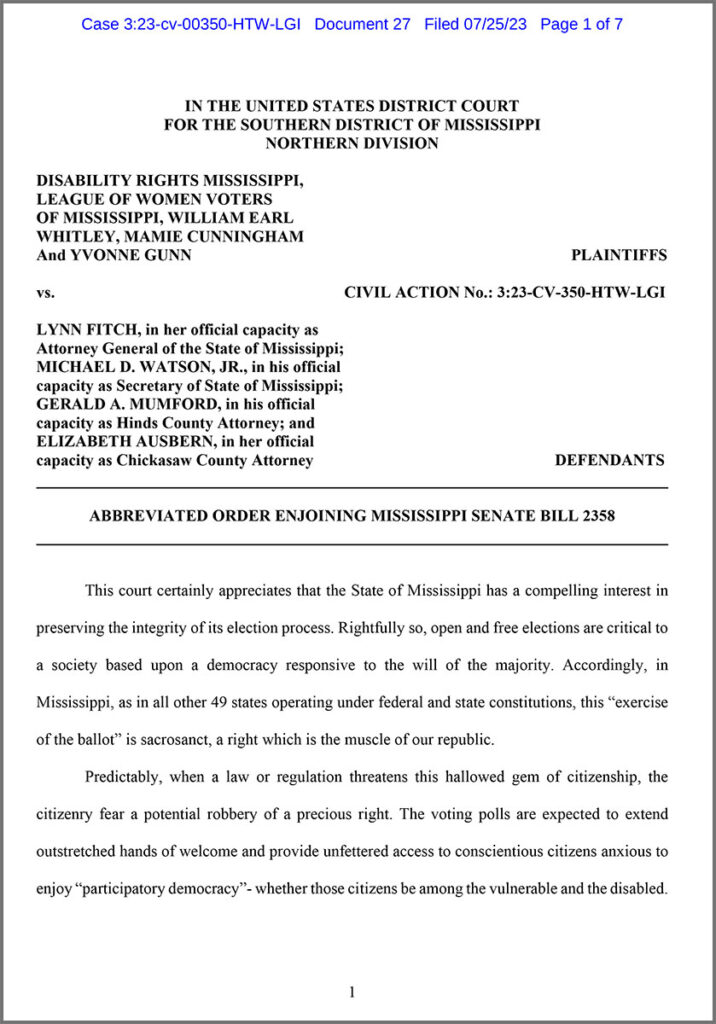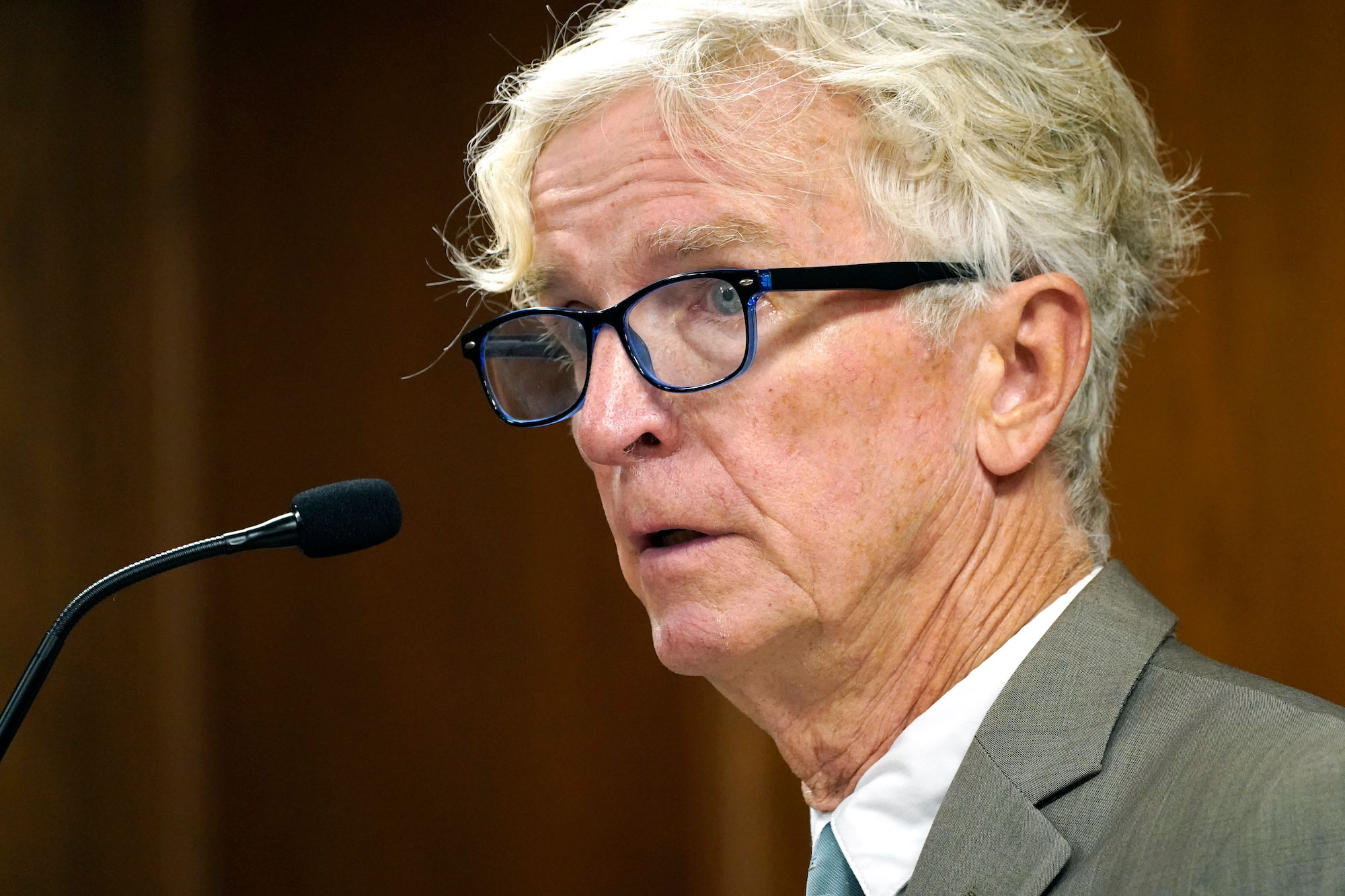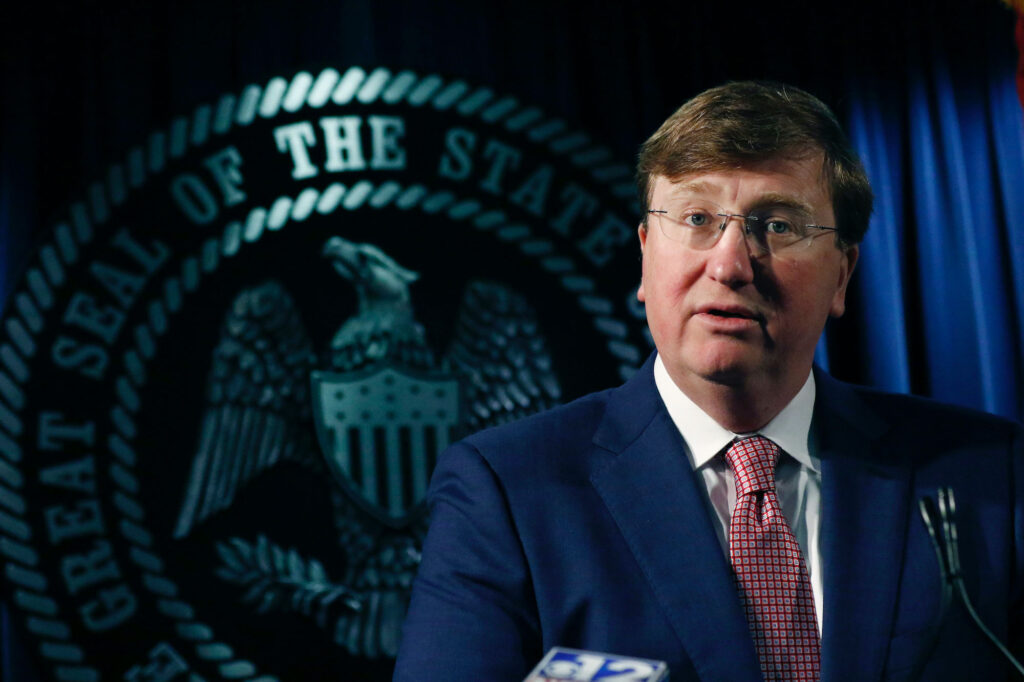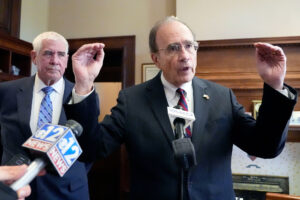Mississippi cannot implement a “ballot harvesting” law that prevents residents from collecting and transmitting absentee ballots on behalf of other voters, including disabled voters, a federal judge said as he issued a temporary order Tuesday evening. He described voting as “sacrosanct, a right which is the muscle of our republic.”
“Predictably, when a law or regulation threatens this hallowed gem of citizenship, the citizenry fears a potential robbery of a precious right,” U.S. District Court for the Southern District of Mississippi Judge Henry T. Wingate wrote. “The voting polls are expected to extend outstretched hands of welcome and provide unfettered access to conscientious citizens anxious to enjoy ‘participatory democracy’—whether those citizens be among the vulnerable and the disabled.”
 The Mississippi Legislature passed and Gov. Tate Reeves signed Senate Bill 2358 into law earlier this year.
The Mississippi Legislature passed and Gov. Tate Reeves signed Senate Bill 2358 into law earlier this year.
It lists five exceptions for those who can transmit ballots, including election officials engaged in official duties; employees of the U.S. Postal Service engaged in official duties; other individuals allowed by federal law to collect and transmit U.S. mail while engaged in official duties as authorized by law; a “family member, household member, or caregiver of the person to whom the ballot was mailed”; and a “common carrier that transports goods from one place to another for a fee.”
Anyone else who transmits ballots and violates the law “shall” be subject to a misdemeanor criminal charge that includes imprisonment of up to one year in county jail and/or a fine of up to $3,000.
But plaintiffs argued that the law is not clear in its definitions, including its definitions of who constitutes a “family member, household member, or caregiver.” In May, the three plaintiffs sued the State with the help of Disability Rights Mississippi, the Mississippi Center For Justice, the Southern Poverty Law Center, the American Civil Liberties Union, the ACLU of Mississippi and the League of Women Voters of Mississippi.
‘Who Is A Caregiver?’
One of the plaintiffs is William Earl Whitley, a Black disabled U.S. Army Veteran from Okolona, Miss., who lost both legs in Vietnam. The other two plaintiffs are Yvonne Gunn and Mamie Cunningham, two local community members who have long helped Whitley by collecting and mailing his ballots on his behalf.
The judge noted in his ruling that Section 208 of the Voting Rights Act of 1965 says that “any voter who requires assistance to vote by reason of blindness, disability, or inability to read or write may be given assistance by a person of the voter’s choice, other than the voter’s employer or agent of that employer or officer or agent of the voter’s union.”
“Now Mississippi has determined to enunciate the identity of allowable assistors,” the judge wrote.

In his decision, Wingate noted that “various terms in the statute are not defined” and criticized its “broad and vague nature.”
“‘Caregiver’ causes the most grief. Who is a ‘caregiver’?” he wrote. “Defendants submit that the American Medical Association defines ‘caregiver’ as ‘any relative, partner, friend or neighbor who has a significant personal relationship with, and provides a broad range of assistance for a child or an adult with a chronic or disabling condition.’ [Docket no. 17 at p. 2]. This court, however, cannot, from the language of the statute, ascertain whether the individual Plaintiffs who previously have provided assistance to eligible disabled voters for many years clearly meet that definition.”
“This court, further, has not guideposts as to which individuals may be deemed ‘family members’ or ‘household members’, the other exempted assistors,” he added. “This statute, then, vests prosecuting authorities with broad discretion in relying upon their own definitions of these vital terms—caregiver, family members, or household members.”
‘An Open Invitation For Fraud And Abuse’
When Gov. Reeves signed the bill into law in March, the Republican governor said the bill would uphold “the absolute integrity of our election process.”
“Ballot harvesting is when a political operative collects and handles massive amounts of absentee ballots,” he said. “This process is an open invitation for fraud and abuse and can occur without the voter ever even knowing.”
But in his ruling, Wingate said the State was “unable to provide any data illustrating whether Mississippi has a widespread ballot harvesting problem.”
“Seemingly, no fact-findings or committee-finding investigations or legislative committee inquiries have focused upon this perceived threat. This may explain why the definitional approach of the statute is so barren,” the judge wrote.

His order temporarily bars the State from implementing Senate Bill 2358 for the Aug. 8 party primaries or the November general election while the case proceeds.
The coalition of voting rights organizations behind the lawsuit celebrated Wednesday morning, with the national League of Women Voters chief counsel, Celina Stewart, saying in a statement that “S.B. 2358 is part of a trend in laws targeting voter services and organizations that assist voters.”
“Many people in difficult situations rely on friends and neighbors to help deliver absentee ballots,” said Impact Litigation Initiative at the Mississippi Center For Justice Director Rob McDuff. “We are glad that voters with disabilities and language barriers can freely exercise their right to vote with assistance from a person of their choosing.”










